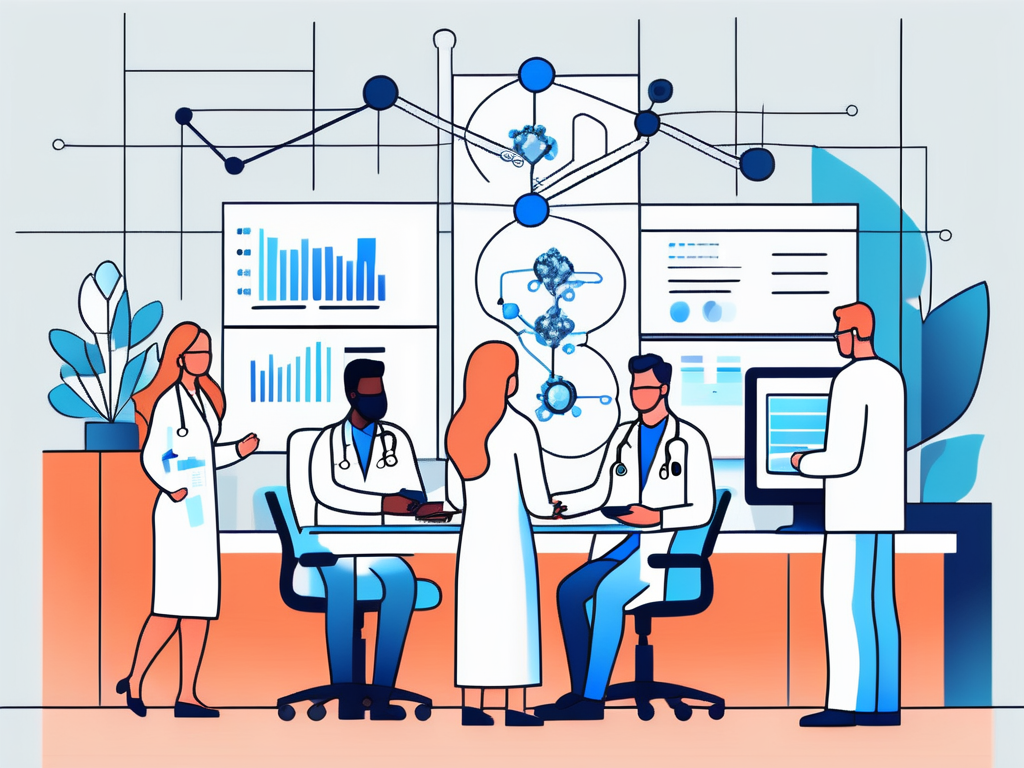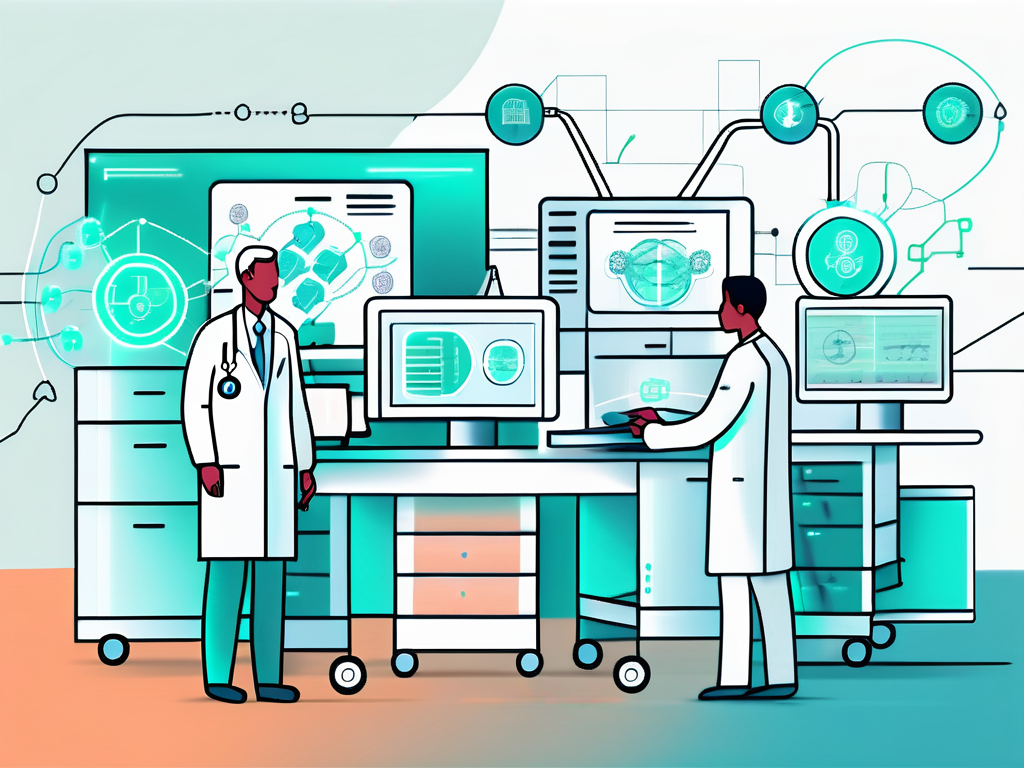In recent years, the healthcare industry has undergone significant transformation, with new technologies and advancements reshaping the way healthcare services are delivered. One area that has gained considerable attention is outsourcing, particularly in the context of revenue cycle management. Moreover, the integration of artificial intelligence (AI) into healthcare operations has further accelerated the demand for outsourcing services. This article aims to delve into the concept of outsourcing in healthcare, explore the role of AI in healthcare operations, discuss the significance of revenue cycle management, and shed light on the future of AI and outsourcing in healthcare.
Understanding the concept of outsourcing in healthcare
Outsourcing, in the simplest terms, refers to the practice of contracting specific functions to external organizations or service providers instead of handling them in-house. In the healthcare industry, outsourcing involves delegating various administrative, operational, and non-clinical tasks to specialized third-party vendors. This allows healthcare providers to focus their resources and expertise on core patient care activities.
The role of outsourcing in modern healthcare
With the increasing complexities and demands of the healthcare system, outsourcing has become a crucial aspect of modern healthcare management. Outsourcing enables healthcare organizations to streamline their operations, reduce costs, and enhance efficiency. By entrusting select functions to external experts, healthcare providers can leverage specialized knowledge and skills, resulting in improved outcomes and patient satisfaction.
Key benefits and challenges of healthcare outsourcing
Outsourcing in healthcare offers several advantages, including cost savings, enhanced operational efficiency, access to specialized expertise, and improved scalability. It enables healthcare providers to focus on core competencies while ensuring smoother workflow and optimized resource allocation.
One of the key benefits of healthcare outsourcing is the potential for significant cost savings. By outsourcing non-core functions, healthcare providers can reduce overhead expenses associated with hiring and training in-house staff. Additionally, outsourcing allows organizations to tap into economies of scale, as external vendors often have the infrastructure and resources to provide services at a lower cost.
Another advantage of outsourcing in healthcare is the access to specialized expertise. External vendors are often highly skilled and experienced in their respective fields, which can lead to improved quality and efficiency in the outsourced tasks. For example, outsourcing medical billing and coding to a specialized vendor can result in faster claim processing and reduced errors, leading to improved revenue cycle management for healthcare providers.
However, healthcare outsourcing also presents certain challenges. These include managing security and privacy concerns, maintaining effective communication and coordination, and ensuring the alignment of outsourced activities with the organization’s strategic goals. It is crucial for healthcare providers to carefully evaluate potential outsourcing partners and establish robust governance frameworks to mitigate these risks.
One of the key challenges in healthcare outsourcing is the need to ensure data security and privacy. Healthcare organizations deal with sensitive patient information, and outsourcing certain functions may expose this data to additional risks. It is essential for healthcare providers to establish strict data protection protocols and ensure that their outsourcing partners comply with relevant regulations, such as the General Data Protection Regulation (GDPR) in the European Union.
Effective communication and coordination between the healthcare provider and the outsourcing vendor are also critical for successful outsourcing. Clear expectations, regular updates, and open lines of communication help to ensure that both parties are aligned and working towards the same goals. This can be achieved through the establishment of service level agreements (SLAs) and regular performance reviews.
In conclusion, outsourcing has become an integral part of modern healthcare management. It offers numerous benefits, including cost savings, access to specialized expertise, and enhanced operational efficiency. However, healthcare providers must also address the challenges associated with outsourcing, such as data security and privacy concerns, effective communication, and strategic alignment. By carefully evaluating potential outsourcing partners and implementing robust governance frameworks, healthcare organizations can harness the advantages of outsourcing while mitigating potential risks.
The intersection of artificial intelligence and healthcare
Artificial intelligence has emerged as a game-changer across various industries. In healthcare, AI has the potential to revolutionize operations, enhance decision-making, and improve patient outcomes. Its integration with outsourcing services has opened new avenues for innovation and efficiency.
How AI is transforming healthcare operations
AI technologies such as machine learning and natural language processing are being deployed to automate routine administrative tasks, streamline data management, and improve clinical decision support systems. This not only reduces the burden on healthcare professionals but also minimizes errors and enables more accurate diagnoses and treatment plans.
Moreover, AI is making significant strides in the field of medical imaging. With the ability to analyze vast amounts of imaging data, AI algorithms can assist radiologists in detecting and diagnosing diseases such as cancer at an early stage. This not only improves patient outcomes but also reduces the need for invasive procedures and costly treatments.
Furthermore, AI-powered chatbots and virtual assistants are being used to enhance patient engagement and provide personalized care. These intelligent systems can answer patient queries, offer guidance on healthcare management, and even schedule appointments, ensuring round-the-clock support and convenience for patients.
The potential of AI in revenue cycle management
Revenue cycle management (RCM) plays a crucial role in healthcare organizations, encompassing various financial processes from patient registration to claims reimbursement. By leveraging AI in RCM, healthcare providers can improve billing accuracy, accelerate claim processing, and optimize revenue generation.
AI algorithms can analyze large volumes of patient data and insurance information, identifying potential errors or discrepancies that may lead to claim denials or delays. By proactively addressing these issues, healthcare organizations can minimize revenue leakage and streamline their financial operations.
Additionally, AI can assist in fraud detection and prevention within the healthcare industry. With the ability to analyze patterns and anomalies in claims data, AI algorithms can identify suspicious activities and alert healthcare providers, helping to mitigate financial losses and protect patient information.
Moreover, AI-powered predictive analytics can help healthcare organizations forecast patient demand, optimize resource allocation, and improve operational efficiency. By analyzing historical data and external factors, AI algorithms can provide valuable insights that enable healthcare providers to make informed decisions and deliver high-quality care.
Delving into revenue cycle management in healthcare
Effective revenue cycle management is vital for the financial stability and sustainability of healthcare organizations. It encompasses multiple steps, including patient registration, insurance verification, charge capture, claims submission, payment processing, and denial management.
The importance of effective revenue cycle management
Efficient revenue cycle management ensures timely reimbursement, reduces claim denials and rejections, maximizes revenue capture, and enhances cash flow. It involves accurate coding, diligent documentation, and proactive communication with payers to minimize billing errors and ensure compliance with regulatory requirements.
Furthermore, an effective revenue cycle management process allows healthcare organizations to allocate resources more efficiently, invest in technology and infrastructure, and deliver high-quality care to patients.
The impact of AI on revenue cycle efficiency
The integration of AI technologies in revenue cycle management holds tremendous potential for improving efficiency and optimizing financial performance. AI-powered algorithms can identify patterns and trends in billing data, detect potential fraud or abuse, and generate predictive insights to optimize revenue capture.
By automating repetitive tasks, such as claim submission and payment posting, AI can reduce manual errors, minimize processing time, and free up staff to focus on more complex revenue cycle activities. This results in faster reimbursement cycles, improved productivity, and enhanced operational outcomes for healthcare organizations.
Moreover, AI can also play a significant role in enhancing patient engagement and satisfaction. With the ability to analyze vast amounts of patient data, AI algorithms can identify patient preferences, predict potential issues, and personalize the revenue cycle experience. This personalized approach can improve patient satisfaction, leading to increased loyalty and positive word-of-mouth referrals for healthcare organizations.
Additionally, AI technologies can assist in revenue cycle forecasting and financial planning. By analyzing historical data and market trends, AI algorithms can provide accurate revenue projections, enabling healthcare organizations to make informed decisions about resource allocation, budgeting, and investment strategies. This proactive approach to financial management can help healthcare organizations adapt to changing market dynamics and ensure long-term financial stability.
In conclusion, the integration of AI technologies in revenue cycle management offers numerous benefits, including improved efficiency, enhanced patient engagement, and more accurate financial planning. As healthcare organizations continue to embrace technological advancements, the role of AI in revenue cycle management will undoubtedly become increasingly significant, revolutionizing the way healthcare organizations manage their finances and deliver quality care to patients.
The future of AI and outsourcing in healthcare
The convergence of AI and outsourcing in healthcare is set to shape the future of the industry. As technological advancements continue to accelerate, new opportunities and challenges will emerge.
With the rapid progress in AI technology, experts predict that it will increasingly be used to augment clinical decision-making in healthcare. From diagnostic support to personalized treatment recommendations, AI will provide valuable insights and support to healthcare professionals. This integration of AI into healthcare practices will further drive the demand for outsourcing services, allowing healthcare providers to leverage AI expertise and best practices in a cost-effective manner.
Moreover, the use of AI-powered virtual assistants and chatbots is expected to expand in the healthcare industry. These intelligent systems will be capable of handling a wide range of patient interactions, from appointment scheduling to remote monitoring. By implementing AI-driven virtual assistants, healthcare organizations can not only enhance the overall patient experience but also reduce the administrative load on healthcare professionals, enabling them to focus more on providing quality care.
Predicted trends for AI and outsourcing in healthcare
As we look ahead, it is clear that AI and outsourcing will continue to shape the healthcare landscape. One of the predicted trends is the development of AI algorithms that can analyze large volumes of medical data to identify patterns and predict patient outcomes. This will enable healthcare professionals to make more accurate diagnoses and develop personalized treatment plans.
Another trend that is expected to emerge is the use of AI in drug discovery and development. AI algorithms can analyze vast amounts of data to identify potential drug targets and predict their efficacy. This has the potential to revolutionize the pharmaceutical industry, accelerating the discovery of new drugs and reducing the time and cost involved in the development process.
Ensuring ethical and responsible use of AI in healthcare outsourcing
While the potential of AI in healthcare is vast, it is crucial to ensure its ethical and responsible use. Robust governance frameworks, data privacy regulations, and transparent partnerships with outsourcing providers are essential to safeguard patient confidentiality and maintain trust in the healthcare ecosystem.
Furthermore, healthcare organizations should continuously invest in training their staff to adapt to AI technologies and navigate the changing landscape of healthcare outsourcing. This will enable them to harness the full power of AI while aligning their practices with ethical and regulatory guidelines.
As the healthcare industry continues to evolve, outsourcing and AI will play increasingly significant roles in driving operational efficiency and optimizing patient care. By embracing these advancements and capitalizing on the opportunities they present, healthcare organizations can position themselves for future success.
As the healthcare landscape continues to be reshaped by AI and outsourcing, the path to operational excellence and optimized patient care becomes clearer. At Clinic Marketing AI, we understand the pivotal role these technologies play in driving your clinic’s growth. Our CEO, Angelo Rosati, brings a wealth of experience from the intersection of healthcare, marketing, and AI to ensure that your clinic not only meets but exceeds the demands of modern healthcare. We are not just a service provider; we are your partner in excellence, committed to delivering monumental value. Book a Call with Us today, and together, let’s transform the future of Your Clinic.




